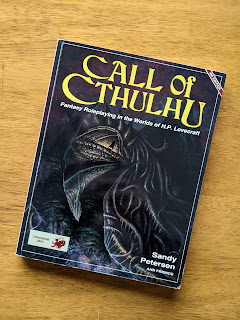There are many ways to judge whether a role-playing game is "good." I've talked to indie gamers who define "good games" as the ones that reliably preproduce a specific gaming experience without fail no matter who is playing. I've met OSR guys who define "good games" as ones that stick to Gary's vision of how play is supposed to proceed. I've chatted with casual gamers who define "good games" as having rules that "get out of the way" and let them get on with having fun.
Here's a different rubric: a "good game" is one that inspires a minimal amount of house rules. In this case "good" means the game feels complete and comprehensive for what it attempts to do. It neither has too much nor too little, and it works as intended.
(Note: I'm not adopting this rubric as the one true lens through which to judge games and define fun. It's a single possible rubric, and it's obviously one with limited utility. But it does have a certain elegance to it.)
By this proposed rubric, Call of Cthulhu is a great game. I'm never really tempted to monkey with the rules. At all. I just don't see anywhere in the game's rules where I could intervene with an innovation of my own that would improve the experience.
As much as I think the small changes present in Call of Cthulhu's 7th edition are nice additions, I also think it's entirely reasonable to play an older edition without those changes. They're nice little flourishes, but I don't think it would even occur to me to create them as house rules on my own.
I'm not sure there's many other games that fulfill the terms of this particular rubric quite as well as Call of Cthulhu.


No comments:
Post a Comment